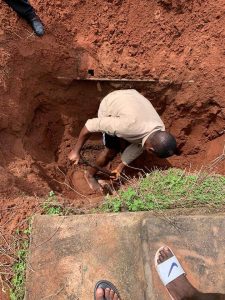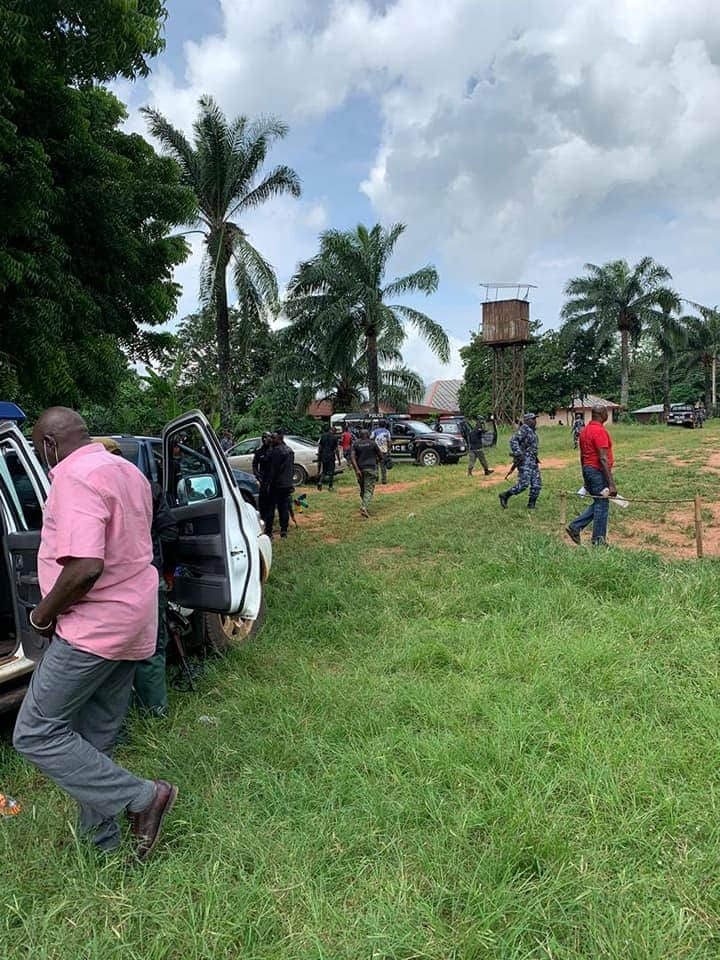Police at Idumuje-Ugboko.
 Digging of an alleged grave.
Digging of an alleged grave.
By Diokpa Chris O. O. Biose
I wish to appreciate all those who rose against the midnight Police invasion of the Idumuje-Ugboko Royal Palace to arrest the Traditional Ruler of the kingdom, HRM Obi Chukwunonso Nwoko lV, the Obi of Idumuje Ugboko at about 1.30 am on Saturday, July 18, 2020. News of the bizarre incident sent shock waves across Anioma and beyond. In a reaction, “Youths in Delta State on Monday condemned the purported invasion of the Palace of the Obi of Idumuje-Ugboko Kingdom in Aniocha North Local Government Area of the state and the subsequent alleged abduction of the monarch, Chukwunonso Nwoko, by police operatives…

The obviously agitated youths said it was an act of brigandage and unruly for operatives to storm the palace in a commando style, insisting that the action was not only nauseating, but insulting, ridiculing, uncalled for and above all, unacceptable.” (Paul Osuyi, Youths condemn alleged abduction of Delta Monarch, THE SUN, July 20, 2020).
The manner of arrest of the King entailed unwarranted desecration of the Royal Palace and rude assault on cherished traditions of the people by men of the Nigeria Police Force, Delta State Command. A news report in the Vanguard newspaper stated, among other things: “The police men who stormed the monarch’s palace in commando style, after he allegedly refused to honour invitation extended to him by the command, threw the community into confusion. Alleging that the king was whisked away from his palace around 2 am in about 15 vehicles that stormed the palace with heavily armed men, the Monarch’s wife, Queen Dumebi, however confirmed that her husband returned home at about 10pm on Saturday.” (Festus Ahon, Police interrogate Delta Monarch over suspected murder case, Vanguard, July 20, 2020, p 15).
I also thank all those who congratulated the King on his release by the Police. I join the good people of Idumuje-Ugboko who thronged the Royal Palace and streets of the town in their numbers, in spontaneous jubilation on the return of the King to his Palace.
However, I strongly suggest that all Anioma people, both at home and the Diaspora, need to insist on getting clear details of the ugly incident. Even without prompting, the Nigeria Police Force owes the people of Idumuje Clan, Enuani and the Anioma Nation an official and full explanation for the reported behavour of its men on that fateful night.
It is a legal truism that nobody is above the law. Any Nigerian citizen, kings not excepted, is subject to investigation by law enforcement agencies, according to law. But if as claimed, Obi Chukwunonso Nwoko IV, failed to honour Police invitation, he probably expected Police authorities in Delta State to understand the social context. Every human being in every society is a product of culture and survives within a cultural context, which subsumes the legal context. No social action takes place in a social vacuum and it is within its context that action makes sense. It is not a question of circumventing or avoiding the law; it is a question of tactics adopted in enforcing the same law in diverse social situations. It is probable that the Nigeria Police, Delta State Command, had no one to intimate them of relevant traditional nuances at that point in time.
The king is always in his Palace. By tradition, the main door of the Palace (Ogwa-Obi) is always open and is never closed. The origin of this custom is that the Palace is a refuge for all indigenes of the community and anyone who runs into the Palace is deemed protected. Unlike politicians, the king cannot hide from his people or from the public. He may visit nearby towns or other places and return to the Palace. Convention requires that a king who desires to travel outside his State should notify the Local Government Council or if travelling outside the country, he should notify the State Government. So, the whereabouts of a king is never in doubt. The king embodies the community that he represents. To that extent, he Is not just an individual; he is an institution. Surely, the Delta State Police Command will find comparable facts in state affairs.
In view of the above, the Delta State Police Command needs to throw light on some questions that bother patriotic and well-meaning indigenes of Anioma. Who made the allegation that prompted the Police raid on Idumuje-Ugboko Royal Palace? What was the content of the allegation? What was the procedure adopted in investigating the allegation? Is it true that the Police broke doors of the Royal Palace to gain entry in their midnight raid? Why was it necessary to deploy the level of force reported and the level of insensitivity for the traditions of the people in investigating whatever allegations might have been made? Is it true that the Police undertook digging of some parts of the Royal Palace Grounds? What were the findings of the Police after their investigation?
In the interest of protecting its image, the Nigeria Police is morally bound to place the full facts of the incident in the public domain. This can be done by means of a press conference, for instance, where the press would be free to ask questions and receive answers, as is done in civilized climes. This would assuage pent up emotions, erase insinuations about ulterior motives to serve private interests and restore confidence of the people on the Nigeria Police Force.
Some people consider the assault on Idumuje-Ugboko Royal Palace to be a private affair of the incumbent King. This is wrong. The extant law regulating chieftaincy institution in Delta State is The Traditional Rulers, Council and Chiefs Edict No. 1 of 1999. The Edict recognises the traditional institution as a creation of the respective communities. These include traditional stools and chieftaincy tittles. The Royal Palace in each community is not a private property of the incumbent. It belongs to the community.
Furthermore, the Royal Palace in many communities in Anioma is not a private property of any particular king. The incumbent king occupies it as the living symbol and representative of the community as long as he occupies the throne. Any individual or organization vising a Royal Palace in Anioma land is not just visiting an individual occupant of the throne. Such a person or organization is visiting a human embodiment of the community because the throne represents the community. That is why kings are revered in Anioma.
It is worthy of note that the Idumuje-Ugboko Royal Palace is one of the most highly regarded in Anioma land. It is a protected site and a major tourist attraction in Nigeria. It is surprising if any public officer serving in Delta State and particularly in Anioma land is ignorant of this fact. It is absolutely necessary for public institutions to brief their senior operatives and give them appropriate orientation about the social environment in which they have to live and work.
I am also aware that there is a standing instruction given by earlier kings of Idumuje-Ugboko that the Royal Palace should be preserved in its present state and may only be reinforced or renovated. A new king is free to add new structures but no king is permitted to destroy any parts of the ancient structure. It is therefore abominable, if the allegation is true, that some intruders destroyed some doors of the Royal Palace.
Before colonialism, kings constituted the pivot of social organization of Anioma communities. In spite of the steady erosion of the monarchy institution by forces of neo-colonialist central and regional governments, imported religions and commercialization of tradition, the monarchy institution is still relevant and can be made more relevant. Therefore, all lovers of indigenous tradition are duty bound to protect it. By protecting traditional institutions, indigenes protect their cultural heritage and therefore their relevance in world history. By ignoring or desecrating traditions, or encouraging others to do so, indigenes do great disservice to themselves and the collective existence of their people. Those Traditional Rulers who demonise their culture and traditions on the altar of religious fanaticism and social prestige undermine the basis of their stools because without culture and tradition, there is no basis for their continued existence.
In Anioma land, it is not a private matter or a joke for any individual, more seriously for an agency of the state, to allege or insinuate that a King of any Anioma community is a criminal or murderer. Since the onset of constitutional rule, as distinct from traditional times, a social context in which a king could commit murder within his domain is unimaginable. In fact, it is part of his duty to unearth dangerous elements in the community and his words should be taken seriously in this regard. This is one of traditional oaths he is made to take in the process of his traditional installation known as igwu ike tie ukpo eze (the ritual ceremony of placing a king on the throne). In Anioma land as also in Ijaw and some other parts of Nigeria, it is axiomatic that “You do not kill a child of the soil to win title in town.”
For those who might not know, it is germane to call to mind that the fundamental value ideal in Anioma culture is ezi-madu (a good person) or nwa- ezi-madu (child of a good person). The values upon which this ideal is built include ezi-okwu (truthfulness), trust, honour, hard work, bravery and personal integrity. These are indispensable components of what constitutes ezi madu and Anioma kings are deemed to be custodians and embodiment of these virtues.
The social ideology of Anioma people, unlike that of some Igbo sub-cultures, is egalitarian rather than individualistic and exploitative. This egalitarian social ideology entails a meritocracy made up of those who are worthy of praise, men who are best in their fields as judged by their fellowmen. The encroachment of conscienceless and intensely roguish alien values of which some nouveau riche are prime conveyors constitutes a social cancer on Anioma body politic.
Anioma has deep regard for character and integrity as well as deference to elders and women. The Aniomas are known to be peaceful, law-abiding, considerate and accommodating. But they are not known to be cowards and when colonial invaders attempted to ride rough shod on the people in the closing years of the 19th century, the impostors were firmly resisted in what is known in history as Ekwumekwu Resistance Movement (1898-1910).
Any Anioma indigene who chooses to climb on the ruins on his people for personal gain or social acclaim needs to watch because that would be the height of abomination. Some misguided New breed may say, I don’t care about tradition or I don’t believe in God but the Law of Karma is inexorable.
The midnight raid on the Idumuje-Ugboko Royal Palace and abduction of the King is a slap on the face of Idumuje Clan, Enuani and Anioma Nation, to say the least. The incident must not be swept under the carpet. I respectfully urge the people of Idumuje Clan, Royal Fathers of Enuani and Anioma Nation to insist on full disclosure by the Delta State Police Command on the issue.
Finally, I wish to take this opportunity to respectfully ask Daily Post Newspaper to desist from further tendentious reporting on the land dispute in Idumuje-Ugboko, based on biased and false accounts by one of its big wigs. Anioma and indeed the Nigerian state deserve peace and progress and truth will go a long way to promote it. As the motto of The Guardian newspaper states: “Conscience is an open wound and only truth can heal it.”
Diokpa Chris O. O. Biose, is the Ode-Uri
chrisoobiose@gmail.com




GIPHY App Key not set. Please check settings